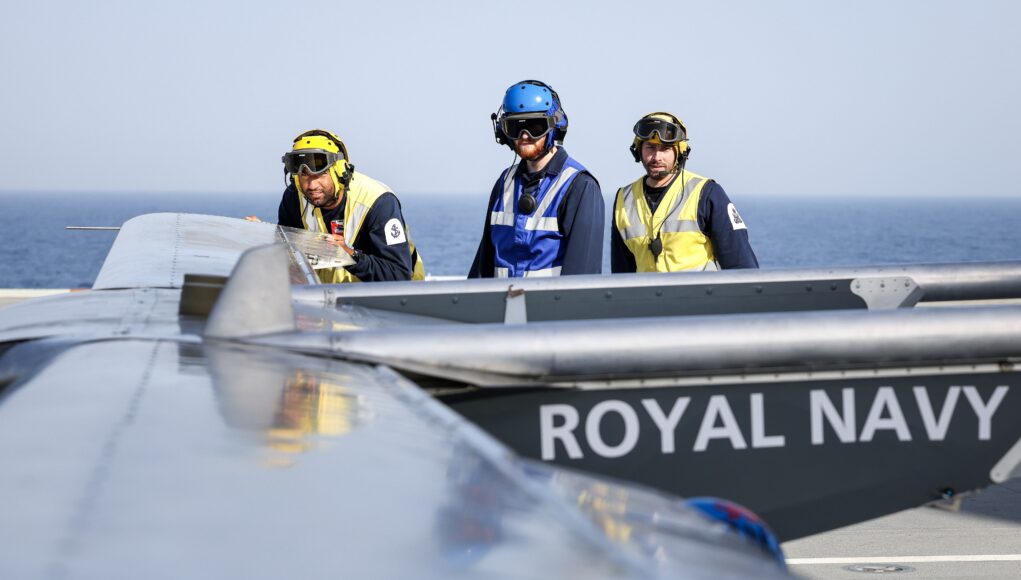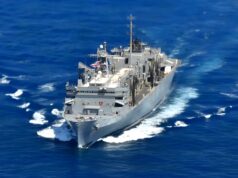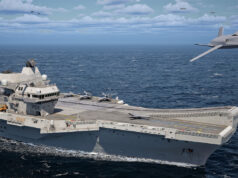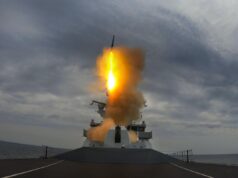Over the past thirteen years, the gap between recruitment targets and actual intake in the Royal Navy and Royal Marines has increased significantly.
While there were years of near-perfect alignment with the goals and actual intake, the overall trend points towards a widening gap between the recruitment goals and the actual number of recruits.
This shortfall has been more pronounced in the Royal Marines compared to the Royal Navy, however.
For the Royal Marines, the shortfall was minimal in the earlier years, with the actual intake nearly matching the targets. However, the gap widened notably after 2016. The largest shortfall occurred in 2023, when the actual intake was 27.37% less than the target.
| Year Ending | Recruitment Target | Actual Intake | Shortfall (%) |
|---|---|---|---|
| 31-Mar-11 | 1218 | 1217 | 0.08 |
| 31-Mar-12 | 758 | 752 | 0.79 |
| 31-Mar-13 | 1233 | 1125 | 8.76 |
| 31-Mar-14 | 1159 | 1030 | 11.13 |
| 31-Mar-15 | 883 | 757 | 14.27 |
| 31-Mar-16 | 995 | 805 | 19.10 |
| 31-Mar-17 | 936 | 734 | 21.58 |
| 31-Mar-18 | 983 | 758 | 22.89 |
| 31-Mar-19 | 1171 | 778 | 33.56 |
| 31-Mar-20 | 1173 | 926 | 21.05 |
| 31-Mar-21 | 1233 | 1050 | 14.84 |
| 31-Mar-22 | 1389 | 1096 | 21.10 |
| 31-Mar-23 | 1096 | 796 | 27.37 |
The Royal Navy’s recruitment story is somewhat different. Initially, the shortfall in recruitment was negligible, with actual intake figures closely mirroring the set targets.
However, from 2016 onwards, just like with the Royal Marines, there was a noticeable increase in the shortfall, peaking in 2023 with a 26.94% gap.
| Year Ending | Recruitment Target | Actual Intake | Shortfall (%) |
|---|---|---|---|
| 31-Mar-11 | 1332 | 1331 | 0.08 |
| 31-Mar-12 | 1472 | 1464 | 0.54 |
| 31-Mar-13 | 1692 | 1642 | 2.96 |
| 31-Mar-14 | 2274 | 2144 | 5.71 |
| 31-Mar-15 | 2377 | 2176 | 8.46 |
| 31-Mar-16 | 2576 | 2192 | 14.91 |
| 31-Mar-17 | 2779 | 2311 | 16.83 |
| 31-Mar-18 | 2843 | 2284 | 19.64 |
| 31-Mar-19 | 3043 | 2365 | 22.29 |
| 31-Mar-20 | 3009 | 2637 | 12.35 |
| 31-Mar-21 | 3176 | 2925 | 7.90 |
| 31-Mar-22 | 2963 | 2494 | 15.84 |
| 31-Mar-23 | 2738 | 2001 | 26.94 |
While the Royal Navy has generally fared better than the Royal Marines, both forces have seen an increase in recruitment shortfalls over the years.
Labour’s Shadow Defence Secretary, John Healey MP, said:
“The Conservatives have failed in defence for 14 years, not once meeting their recruiting
targets for our Royal Marines and Royal Navy. This is further evidence of the growing Tory
‘crisis’ in Armed Forces recruitment and fuels fears about our ability to fulfil our NATO
obligations in full. The Conservatives have corroded the nation’s moral contract with those who serve. Personnel are living in damp and mouldy housing, satisfaction with service life has fallen to almost 40%, and more people are leaving than joining our Armed Forces. In Government, Labour would renew the country’s commitment those who serve; by fully
incorporate the Armed Forces Covenant into law, tackling the shameful state of military
housing and legislating for an Armed Forces Commissioner.”














Wages? Numbers? Getting rid of Capita and getting actual serving personnel into AFCOs?
That is what I’d like to hear him vow on this.
Spot on DM, and dead right! Conservative party fraud and corruption at it’s best.
Explain?
Capita are a major Conservative donor. Pure coincidence that they got rewarded multiple govermement contracts that under perform and have not been removed from the contracts.
Has outsourcing critical roles like this ever succeeded?
Honestly don’t have the data to say either way. It’s fair to say that a lot of these services were not delivering under public ownership either, so failure of the outsourcer in isolation isn’t that useful without data on how performed before adjusted for changes in between.
Bollocks!!
Care to provide evidence to support that?
Successive governments have had a vested interest in details not coming out, so that value for money to the tax payer can’t be assesses either way. To my knowledge no independent review has ever been done for it across the various outsourced contracts.
Steve public sector procurement does not work like that. You might argue that procurement is long winded, overly bureaucratic, badly managed etc. but politicians have virtually no influence on who the successful supplier might be. That is all down to the procurement process and those (normally civil servants) evaluating the bids against the published criteria.
Well that has been proven to be completely untrue, not heard of the vip lane or the various court cases that the government has lost over it. On paper the procurement process is there, but in practice MPs can heavily influence and direct it as they control departmental budgets and power over who gets promoted etc in the civil service. The national audit Office was setup to try and stop it, but as their budget is politically driven they are careful what they audit.
Policiticans also set the parameters for any tender (what they are looking for from the outsourcer) and that can easily be tweaked to ensure a preferred supplier wins.
Nonsense Steve. The PPE issue is quite different. It only came about because traditional suppliers could not supply the product requiring desperate measures which any Government would have attempted in similar circumstances. You are clearly big on conspiracy theories and you can dispute everything with a conspiracy theory however most of the time the simplest answer is normally the correct answer. For the RN you need a specialist recruitment firm.
glad there are people that still believe in polictics, in spit of everything that indicates otherwise.
Do I believe in people standing up and offering their services to make the world a better place. Yes I do. Despite the reality that there are some bad actors I believe that the main issues are incompetence & stupidity. The problem is that politicians reflect society – which is how it is supposed to work. Society is full of people with all their faults.
With so much corruption going on in recent years and more and more cases coming out, i have no faith in polictics anymore. The new government will have to work hard to rebuild the checks and balances that have been broken down /removed over recent years.
I think the problem is less corruption and more that companies are playing the system. True the system needs changing however different suppliers could well be sucked into that area of defence expenditure as the demand for smaller autonomous systems (in quantity) builds. The trouble with politics is it is the only show in town unless you fancy autocracy.
Explain??? Only tories could explain why the recruitment process needed to be privatised!
Tom the recruitment process along with virtually every other process across Government was privatised due to EU procurement rules decades ago. Recruitment companies got themselves onto recruitment frameworks based on the criteria set by civil servants. The RN can take any of the companies on the framework, run a mini competition, or indeed run their own procurement if they need a specific requirement. Politicians have little if anything to do with it.
EU procurement rules do not apply to defence. that just a load rubbish spun out by politicians as an excuse, they are just acting like a lot of big corporations and try to move the cost away from in house .
True EU procurement rules are not binding for defence. Does this mean that the MOD has not adapted those rules for it’s own use or does not have access to Government framework contractors if it so wishes?
👍Spot on.
I have one son serving and the other waiting to get in, and has been for 18 months.
Capita have caused issues every step of the way and now his application has been handed back to the navy because they’re winding down Capita’s involvement and he’s pretty much had to start the process again. He’s been through 4 TMU’s and one PMU which was upheld by the Navy, but Capita have passed him back as TMU so he’s back to the start again.
Many would have given up by now. I’m not surprised they can’t get recruits when all Capita do is try to make money out of the process.
His recruiter has so many cases that are in a similar boat (pardon the pun) and they simply don’t have the resources to deal with the Capita mess.
Other than the pay not being great, my other son enjoys his role in the Navy but works ridiculously long hours when on deployment.
Many improvements needed!
Yep the one thing you can draw from all this is that Capita running the recruit process isn’t working
Spot-on! Blindingly obvious to anyone but the government.
2 errors on your comment! CAPITA dont handle RN applications, uniformed serving FTRS personnel (often full career personnel/there are some regulars in there also) handle the applications and are in the AFCO’s everyday
Let’s talk about the 8 RAF Typhoons, a Voyager, and a RC135 crew that have deployed to Nellis Air Force base for the first Red Flag of 2024 instead. 🇬🇧🇺🇲
Positive as usual Robert but we cannot hide away from the facts. Almost every report in the last couple of weeks has shown shortages, undermanning, budget shortfalls and waste. It has to be dealt with.
All true but it’s worth noting the USA that has a bid enough defence budget to take on god has the exact same problems.
Lots of people wanted to join the military when there was a real chance for combat in Afghanistan, not so many want to be in a peace time force and we are at the highest employment levels ever with lowest unemployment levels since the 60’s.
These are all big factors on military recruitment.
…. and wage inflation. I suspect it is/has been particularly poignant in recent times with wage inflation playing its part. I know of some who have taken roles in civi life rather than take a promotion as the money on offer was much higher. The military don’t take ‘industrial action’ for better pay and conditions either!
Ahh, interesting, well said Robert, I’d like to know more on that too. Hint, hint George!
The years 2011-2013 are outliers that are distorted by defence cuts downsizing the RN by 5000. In those years recruitment in many areas almost stopped and there were also thousands of redundancies of skilled and experienced personnel (e.g. several dozen FAA Harrier pilots). Of course the downsizing overshot significantly and a decade later the RN hasn’t recovered from that disaster. Entering the RN/RM just doesn’t seem to be an appealing career for young people in the UK. I would also be interested in an unbiased study as to whether policies intended to equalise recruitment across genders and ethnic minorities have had a positive or negative impact on numbers.
Who the hell would want to join?
I wanted to many years back when at college until a health issue ruled it out. If I was that age now would I still want to? Hell No!
Everything is a shambles, there’s very little positive news to be seen anywhere, it’s all a run down mess! It would so disheartening compared to how I viewed the prospect back then when I viewed our forces with pride.
Sad but true. Unfortunately your view, and mine, are in a minority of their own.
I always wanted to join but the money was just nothing like what I could earn else where and the life is torture for anyone that wants to get married and have kids. I did 3 years in the TA and hated it, total waste of time, we were treated like an equipment reserve for the regulars who would always pinched our kit whenever we were on exercise.
This was in the early 2000’s when the army treated the TA with distain because it thought it would not need it post Cold War and the standard equipment issued to British soldiers was a joke. The SA80 A1 being top of that list.
Looking at what the guys are issued with now a days it’s far far superior but then that’s what 15 years of war gets you.
Back then everyone had to buy their own boats and using mobile phones because radios were not working was common.
You don’t hear about this kind of stuff anymore.
The RN needs to take a leaf out the Army’s books, perhaps if Jack was to buy his own boats, we’d get a bigger navy.
Couldn’t agree more.
I was just listening to Grant Shapps declare the era of the Peace Dividend is over. Not that he was actually promising more money, just that we would strive to reach 2.5% as soon as possible, but if there is some going, recruitment and retention is a good place to start.
2.5%, “as soon as possible” or not, is still peace dividend era spending. John Major’s government reduced it from 4% to 2.5% of GDP. That was the peace dividend. What Prime Minister Cameron did in 2010 wasn’t so much taking the peace….
In the 30’s it was 2%.
Spending 4% long term is actually pretty high historically.
Overspending long term is a good way to loose long term.
1% of GDP over a 40 year life cycle period would equate to 50% debt to GDP
Imagine what 1% of GDP around £25 billion a year would do for infrastructure
2.5% spending on the core military budget excluding foreign aid and operations which was outlined in the last real defence review we did in 98 is affordable and sufficient.
We have to agree to disagree. It dropped below 3% in the first half on the 1930s, and somewhere between 1.9% and 2.5% during 1933 depending which source you take, but I can’t find any estimates that suggest it dropped as low as it has been over the last decade. And it was just one year that it dropped so low, not the whole of the 1930s.
“Starting at 2.9 percent of GDP in 1936 it reached 3.75 percent in 1938, and 9 percent in 1939”
UK Public Spending.
The COW project has us at 3.6% in 1936 and 30% of GDP in 1939, a full war footing. We were still unprepared for WW2.
A difference is that 10% of the budget is no longer what most people would deem defence spending, being on pensions, domestic security and the like. And another 10% is on nuclear, not a burden we bore in the 1930s. 2% now would have been 1.6% equivalent back then, and it’s not just a one year blip.
So while I agree 4% is historically high for periods leading up to a war, that’s possibly why they led up to a war. Unlike the 1980s with spending between 4% and 5.5% (post Falklands), which led not to war but the collapse of the Soviet Union. For the current risk level, I believe 2.5% is far from sufficient. Rearmament is costly.
Did GDP in the 30s include the Empire?
In the ’30’s the country was struggling with the Depression, and the public and HMG had no appetite for war- since they all remembered how well the last one went. If they were rationally appraising the deteriorating security situation they would have increased the budget and capability anyway, but fell into the same trap as the current lot of hoping that avoiding escalation would somehow make the problem go away. Instead they ended up having to spend at a level that bankrupted the country because they failed to nip the Hitler problem in the bud. 4% is high historically, because ‘historically’ the tax base was much lower and the state much smaller in real-terms than it is now. In the era that lends itself to meaningful comparison- i.e. since WWII, it averaged >5% throughout the Cold War era, declining to current levels only in response to the supposed ‘peace dividend’ that no longer exists (if it ever did). For comparison, US defence spending has never fallen below 3% since WWII. Right now it’s about 4.5%.
Why would a young lad join – poor wages, away from home for months at a time, seeing the world is no longer the big sales point it used to be.
Plus the trips ashore are rare these days. When I was in the RN (80s) I did deployments to Africa, South America, Continental Europe, central America, North America, Antarctica, the Artic region, all over the Caribbean and lots of fascinating places in between. And that was normal for every matelot pretty much. These days they hardly go anywhere, MOD can’t afford it and there is hardly any fleet left anyway.
👍
So after 13 years of Tory rule we have :
Not enough Ship’s, not enough sailors , not enough missiles,
Not enough Airmen, too many white pilots , not enough planes,
Not enough Soldiers , Not enough Tanks, Self propelled Guns, Helicopters
But we do have enough MPs, who almost all to the letter, subscribe to the point of view that we spend far too much money on the military, we have some who wanted members of the IRA to receive medals, some openly support Islamic terrorism, and some see British servicemen as the terrorists, we put up people with no links to the country in Hotels , whilst servicemen and their families are put up in sub standard housing and with some former servicemen having to live on the streets.i wonder how the U.K. will look in another 13 years,
In the words of Father Ted…” careful now”…
He’s right. Putting ones head in the sand isn’t working anymore.
Not sure it’s political. The American woke disease infecting UK knows no political boundaries.
In 13 years? It will be fourth rate and a mostly muslim country.
Please don’t even go there 😕
To be fair, I believe the tory scum are ridiculing and trashing todays ‘younger generation’, in their attempts to deflect what they have done to Armed Forces recruitment.
Uk… population of 65+ million people, and we cannot recruit a 1000 people to crew a few warships? Utter bollocks!!
**population of 65+ million people, and we cannot recruit a 1000 people to crew a few warships? Utter bollocks!! **
Exactly this. It doesn’t add up.
Its nothing to do with Conservatives and everything to do with Gen Z youth not interested in serving their country, compared to other generations. And who can blame them? The BBC, other mass media and UK education institutions regularly tell our young people that Britain is rubbish and everyone should be ashamed of their colonial heritage. People are told the union jack as an anachronism, an indicator of evil conservative thinking and colonial brutality.
Woke and identity politicking constantly rammed down the throats of Gen Z has worked.
While not quite agreeing with some of the points you make, the overall message is correct. I grew up with news of Afghanistan and terrorism. Most people my age have just decided “all fighting is bad” and stopped there. We are so connected globally that patriotism is equated with nationalism, which is only okay if you have a greater power oppressing you.
The Mass media is not the problem, it is social media. It is very hard to try to stay on the straight and narrow politically online (look up studies on it, they mostly relate to self-harm but the message is clear). The headline is the most important thing people read, so I have close friends who talk about ‘israeli apartheid’ and genocide, while gently ignoring that much of Gaza support the idea of genocide.
Similarly, whoever can get the most harrowing pictures of burning hospitals and crying children wins online.
I also think that wokeness mentality and probably some “equality, diversity, and inclusion” madness is filtering out perfectly good recruits too.
It just comes down to money, the military has to compete with the private sector, and in an era of low unemployment, piss poor management of recruitment (thanks Capita!) and shockingly low wages the military doesn’t stand a chance.
You don’t think it’s the poor pay and conditions?
100% agreed. Britain has picked up the American identity politics woke disease. Group think, collectism or socialism portrayed as superior to indiviidual rights or empowerment. It’s killing the country.
There it is. Exactly.
Of more interest would be the intakes for the RN by Branch. In past years info on gapping per branch was open source…then it wasn’t and you only got the overall numbers picture.
The issues with the Engineering branches was dire and from speaking to RN Engineering Branch members its hasn’t improved. This is despite increases in pay, bonuses, retention payments, reintroducing the equivalent of “Tiffs” pay, Branch rework.
The damage was done decades ago from a combination of the recruitment black hole of the 90s, Pay 2000, Warfare Branch Development, Tiffs being disbanded, Pension changes, CLS contracts and numerous below inflation pay rises.
and thats before you get to the current issues with Capita.
However with the length of time it takes to join you will probably find the 22/23 figures are skewed by COVID lockdowns from the years previous to. The RN also allowed people to stay the mob during lockdown despite having there notice in or contracts expiring because of lockdown. That helped to make the overall manning figure far better than it should have been during that time.
Why the age limit? I’m an electrician with years of experience but I’m 38. Yet still fit.
The retention rate is missing from this data- and is very important. Even if your intake met the target it wouldn’t do much good if the new intake leaves at the earliest opportunity.
Well Gurkhas for the Army ,how about the Navy .I know guys but still sure there be up for severing HMG Armed forces. 🤔
The RN need to give young people reasons to join, or they won’t, it’s that simple. Training/qualifications, leave, pay and travel would seem to be the main carrots that the RN could dangle in front of the target age group. They need to up their game in all of those.
If the RN gave out qualifications that civvy street wanted or post service education (like the US GI Bill) aligned with degrees of mimimum service for the size of post service carrot, we might get somewhere.
The young matelots of today also want better living conditions – afloat and ashore – than I had, and my conditions were better than my fathers and my grandfathers so progress in that field is normal.
Ultimately though, the public doesn’t care. One day they will, and then it will be too late.
It wasn’t
Thanj you George for replying. That is odd; in the past ,though rare, I think I received an e-mail to say ‘your comment has been approved’.I think moderation is there for a good reason.Best Wishes
‘Thank you’. Opticians! I need one!
Lots of noise regarding not enough manpower to keep ships at sea if so why are we persisting with the 2 crew system used on ships deployed overseas? 3 month on 3 month off, understand the use on nuclear deterrent boats but seams totally wasteful us of available bodies.
As a young person, 24 who often works with even younger people on a regular bases and who is very familiar with the military. Young people on the whole are not apposed to military service, in fact even some of the most liberal and woke people I know have considered it at one point or another. For a lot of those that do apply they simply drop out as the application process takes too long. Additionally gone are the days of the local factory employing everyone in the town. for young people with even an ounce of determination there are simply so many opportunities for them now that they don’t need the military. All the while all three services have become picky on who they recruit expecting a high standard of individual while, in real terms, their reward is depreciating. Although on a side note the recent recruitment campaign focussing on ethnic minorities and females is not really an issue. the reality is white males are more likely to consider a military career then most and will be enticed through other sources of recruitment besides adds. Where as other people will not be and yet they continue to grow as a % of the recruitment pool especially in skilled areas. So the MOD needs to reach out to these people that wouldn’t necessarily think about a military career. However, retention is another significant issue that needs fixing before recruitment is resolved.
Couldn’t agree more on that one thing that has reared its head of late is DEI people who want too join up and serve their country are being crippled by Quotas not being reached or overfilled DEI practices should be ignored
Treat everyone equally.
That’s how it should be but its box ticking got to be Diverse and Inclusive which is stopping people who want too join the RAF got caught out on that one
God I miss the days of a good old Press Gang run ashore and bring back on-board somme willing volunteers
Does anyone know how much of the Mod yearly budget is spent on paying armed forces personnel and how much a 15/25% pay rise would dent this?
Total MOD budget ca. £70 billion. Service personnel account for about a quarter of that (and civilians about 5%), so you’re talking about an increase in staff costs roughly in the range £2.6 – 4.4 billion, assuming a uniform uplift across all roles.
I don’t know what would be easier trying to convince the treasury you want £4 billion a year for 5 type 26 or a massive pay rise.
Probably the pay rise
Careers Service?